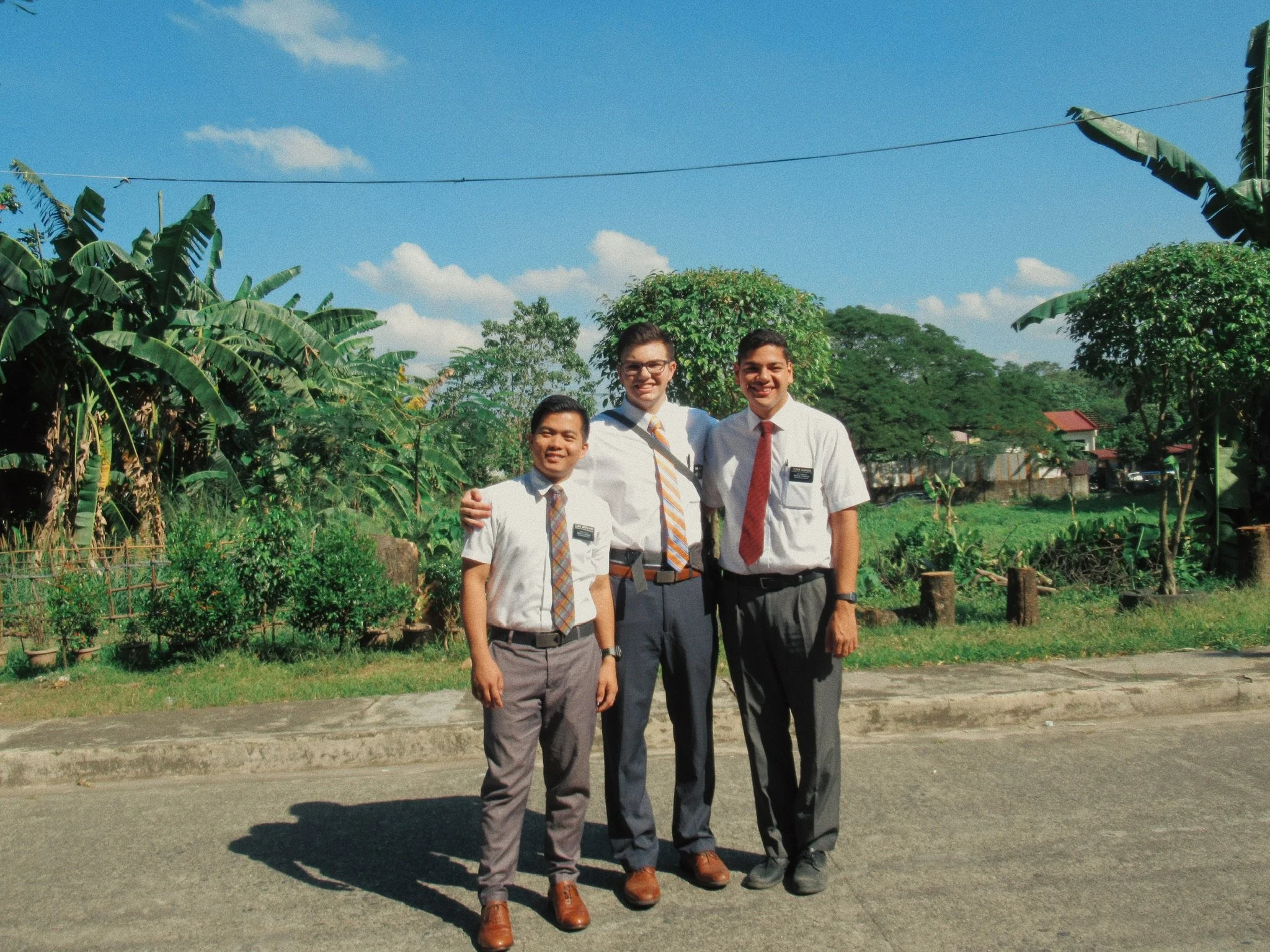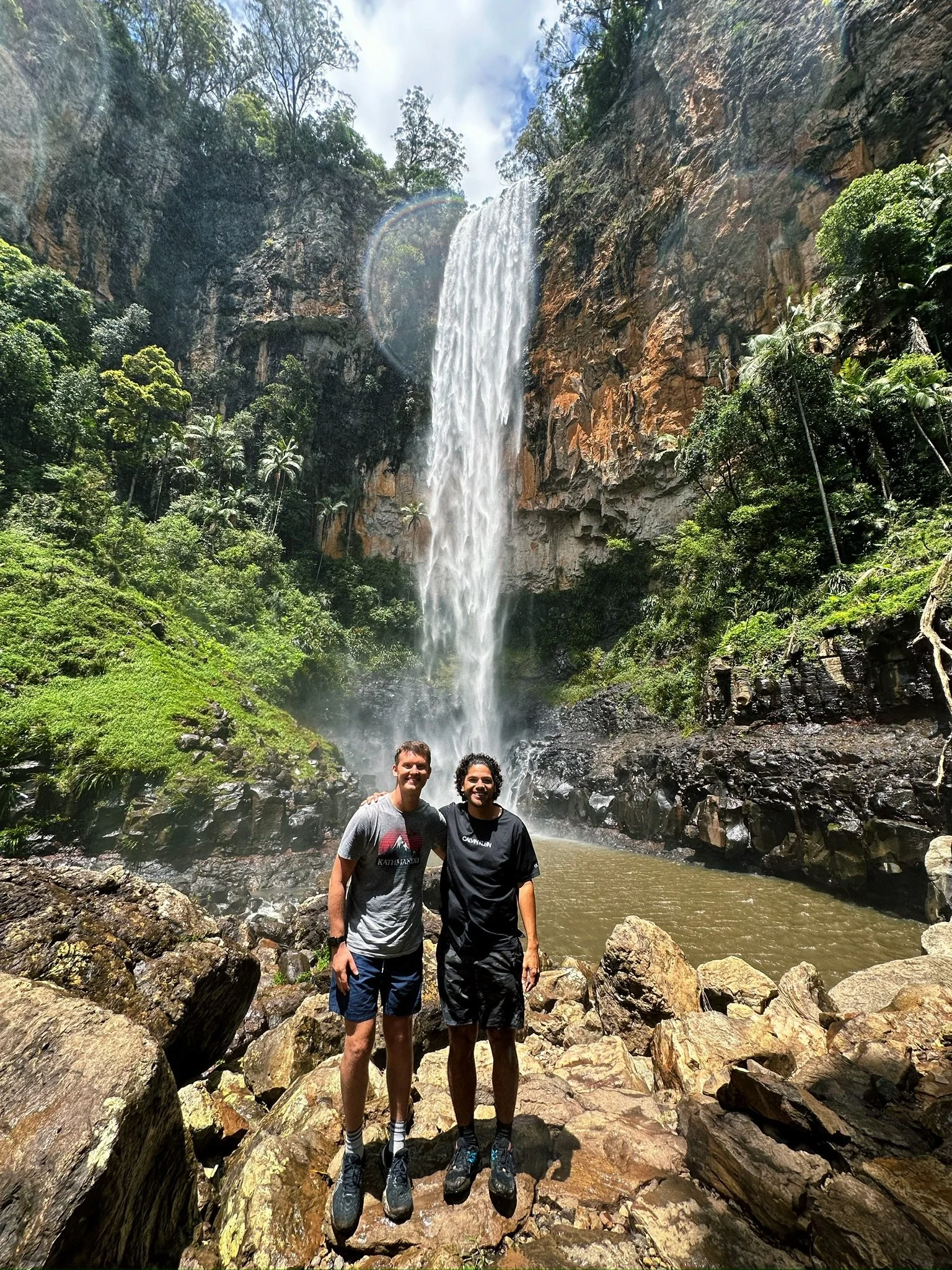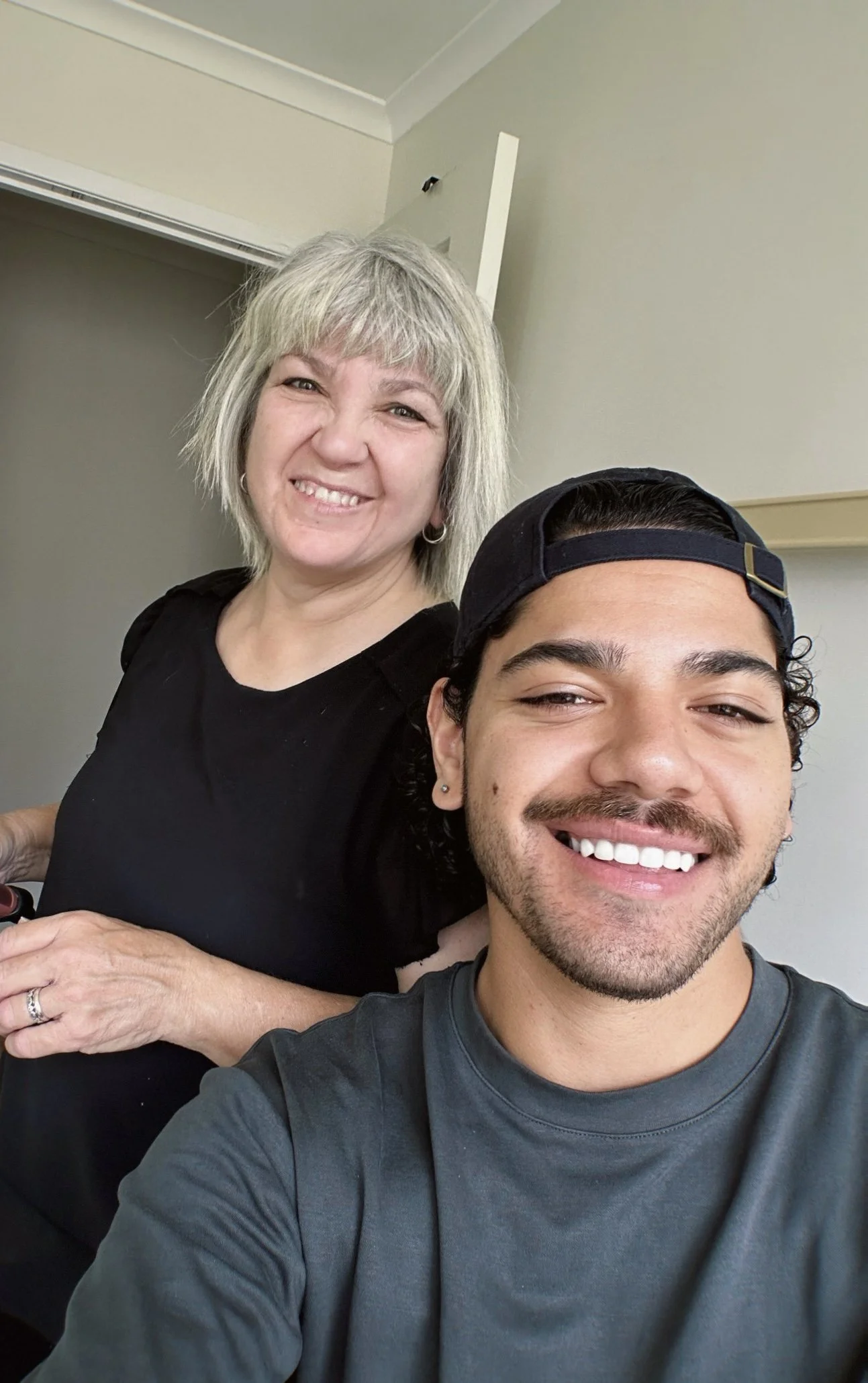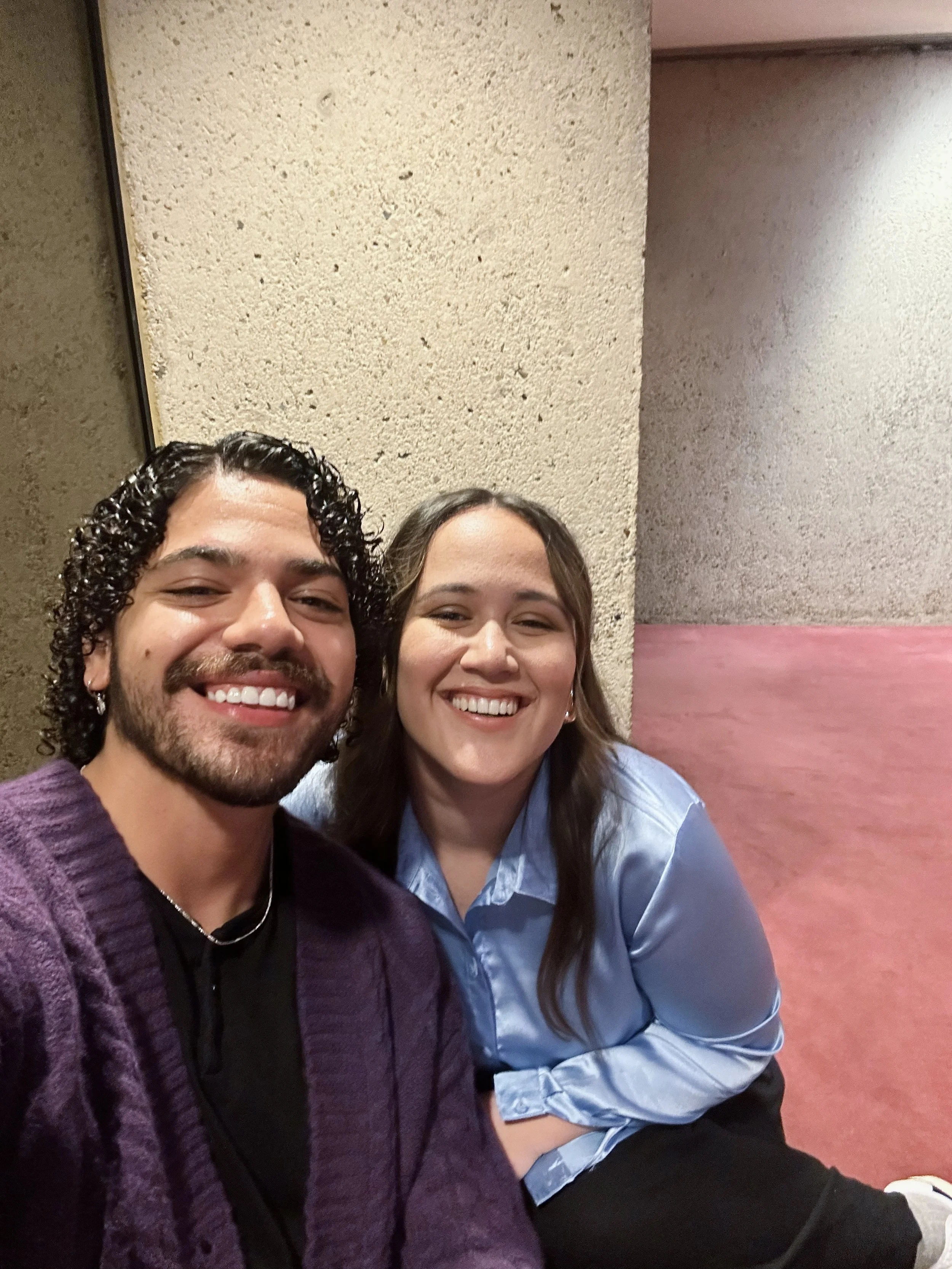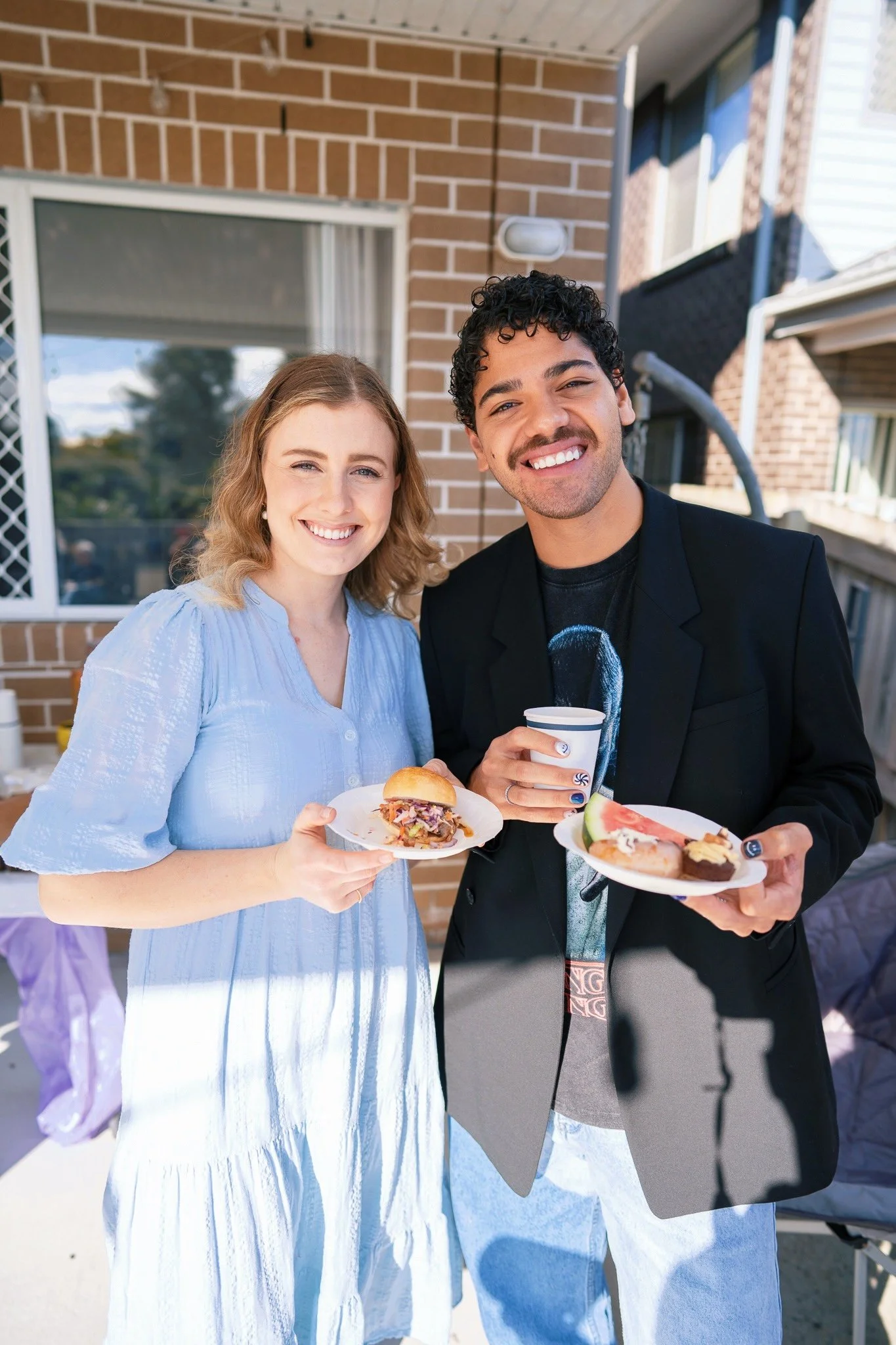THOMAS AUSEUGA
content warning - suicide ideation
Thomas Auseuga was born and raised in Australia and currently lives in Brisbane; however, having spent the last three months in Utah has made him consider a permanent move to the states. “I think I’ve met more LGBTQ+ people in one month here than I have in five years in Australia.” Thomas brought a trademark jar of Vegemite with him to share with new friends, and it must have worked, as he bonded with many at September’s Gather conference in Provo. Thomas loved Gather, but said going to church the following Sunday, even in Utah, felt like a harsh reality that things aren’t quite where he wishes they were just yet. However, Thomas feels called to the space he’s in at the moment—being an openly gay, outspoken advocate for the LGBTQ+ community within the LDS church. But that doesn’t always make it easy.
Thomas grew up with his twin brother smack dab in the middle of eight children raised in a Polynesian/Australian family who was “very into the church.” Both of Thomas’ parents served missions, as did his mother’s second husband and grandma. “The gospel was the epicenter of our home,” says Thomas, despite religion and church attendance not being a popular choice for many of Thomas’ peers in Melbourne, and later Adelaide, after his mom moved the family there. Thomas was the smallest of his siblings and was picked on quite a bit at home. At school, he was teased for having an “effeminate, higher pitched voice” and was called “church boy,” which he says was “supposed to be a derogatory slur, I guess?” Thomas says at times he had a rough childhood in which he often felt isolated and lonely, but knew he had a family who loved him and was grateful they had the resources to get by. Thomas also recalls being called gay before he ever knew what the term meant.
Around age 11, Thomas began to feel “a connection to one of my mates. I wanted to be around him—a lot. Now, as an adult, I see that as my first crush.” But because the dialogue surrounding gay people in the early 2000s was so negative, Thomas internalized that all things gay were bad, and besides, he went to church every Sunday so, “Of course I couldn’t be gay.” Thomas’ shame around this plagued him to the extent he’d cry himself to sleep every night, “praying for Heavenly Father to take this away, or I’d prefer not to wake up in the morning. That was my habitual prayer. I definitely experienced suicidal ideation growing up.” But at the same time, Thomas would pray he’d be blessed with protection. Heeding a prompting, Thomas says he felt God’s hand in helping him reframe negative thoughts he battled at the time. When he was 15, he felt directed to tell his mom the feelings he’d been battling alone for three years.
“She told me she loved me, but my mom’s experience was limited with this, so she said, ‘You’re not gay, you just think you are because everyone calls you that’.” Thomas explains that a lot of her fears stemmed from her perspective on AIDS and the mistreatment of gay people, fearing discrimination and rejection. Offering her grace, Thomas says, “She tried her best with the knowledge she had.” Thomas also told his bishop at the time, who offered him a pamphlet, but didn’t say much to unpack the coming out discussion.
Four years later, at age 19, Thomas finally came out to his best friend. “He handled it pretty well, but needed a couple days to process. When he came back, he said, ‘I love you anyways, you’re my best friend; it doesn’t matter’.” That opened a dialogue that taught Thomas that when he opened up to people and was authentically himself, it deepened their connection. By age 21, he’d come out to his three best friends and every bishop he’d had up until that point. He remembers feeling, “It was surreal that I could tell people, and they wouldn’t hate me or try to fix or change me. I could be myself with them and talk about it on a regular basis.”
At the time, Thomas was feeling stagnate living in Melbourne, in a dead-end part-time retail job and a YSA environment that left him feeling belittled and beaten down. After two years of this, he began to feel depressed, stuck, with no upward trajectory. Thomas had convinced himself he wasn’t smart enough to serve a mission like his siblings had. He was active in the church then, but “mostly just for the social scene and food after.” He began to see a therapist his bishop had recommended, after referring to his being gay as “an addiction.” Luckily, the therapist was more experienced and created a beneficial, affirming environment for Thomas in which he could steer his own path whichever way he chose.
“At this point in time, I feel like I had hit rock bottom,” says Thomas. He wasn’t fully invested in the church but felt a constant pressure to date girls, and to serve a mission before that. “Finally, I said, Heavenly Father I don’t want to serve, but since you’re giving me promptings, I will. And from there, my desire to serve grew.” It took Thomas a year to get his papers submitted, and despite his plea bargain with God to not be called to the Philippines (after being told by his two siblings how hot and sweaty it was, along with a side order of food poisoning and other sicknesses they experienced), Thomas was called to the Philippines. “I lost 40 pounds, though, so I guess it was… a blessing?”
In reality, Thomas loved his mission and felt it changed his life. There, he grew the confidence in studying both the scriptures and a foreign language to the point of fluency. He helped support companions and other missionaries as their pseudo-therapist, and Thomas’ mission president likewise affirmed he should go into social work or therapy of some sort, a second witness to the spiritual nudge Thomas himself had been feeling. Covid-19 cut Thomas’ mission 12 weeks short. He came home in March of 2020, and got into his social work course six weeks later. He’s now in the second to last semester of his degree.
His mission helped Thomas to “understand how important the gospel is to me. I always want it to be a part of my life.” When he came home, at age 26, that meant trying to date girls to prepare for a temple marriage. Thomas drove 24 hours north from his family’s hometown of Adelaide to move to Brisbane to expand the dating pool, but began to see a trend that the more dates with women he went on, the more his mental health declined. “They were all lovely, nice, cute girls. I just wasn’t attracted to them.” One girl asked him out a couple times, and each time he’d drive over to pick her up, Thomas would find himself crying and on the verge of a panic attack. At the same time, he had a bisexual friend he’d developed feelings for, so he says, “I knew what attraction and romantic feelings felt like. So in contrast feeling nothing on dates with girls would just lead to a depression spiral afterward.” Thomas’ bisexual friend ended up marrying a woman, so this gave him the added confidence to do the same, and Thomas tried hard to make it work with one young lady. Three dates in, she friend zoned him. After two days of sadness over the effort he’d put in to try to make it work, Thomas finally prayed surmising he was now off the hook, he’d tried his best. The answer he got in return was that it was time to come out publicly.
Not wanting to be the victim of a hate crime, Thomas resisted this impression. But finally realizing it was best for his mental health to do so, Thomas prayed that the decision was right and wouldn’t be detrimental to him. One Sunday afternoon, he sat next to his best friend while he pressed post on Facebook, sharing words it took him 28 years to say out loud, to all. “After that, a weight lifted, and my life changed in a really good way.”
Thomas began to speak up about LGBTQ+ issues in his ward and circle of influence. At first, he had friends confess they’d never met a gay person before. He himself only knows a handful of openly gay, LDS Australians. Thomas says, “It’s been two years of helping to educate others. I feel very called to the work right now in this space.” Thomas described an experience at a recent YSA Q&A in which people could submit anonymous questions. Naturally, Thomas submitted questions focusing on LGBTQ+ inclusion. One person asked, “Why do we have to include gay people?” Thomas was impressed as others jumped in for him and said, “Why wouldn’t we? It’s Jesus’s church, and all are part of the family.” Thomas has also proposed to his stake president that they do an LGBTQ+-themed devotional across the board, not just for the YSA.
Thomas feels peace going to the temple and to church and feels lucky to have a support network in which he can be himself. He says, “I didn’t really lose friends when I came out. Those who don’t talk to me now—it’s more a reflection of them than me.” While he says he could decide to get offended or not talk about it around certain people, he prefers to share his personal experiences with love in hopes it educates and changes someone’s attitude towards the LGBTQ+ experience. “When you’re one of the only openly gay people in this space, that’s kind of the attitude you have to have.”
Although Thomas thought he’d be single forever, over the last few months, he’s opened up more to the idea of dating men. “After the Gather conference, I realized being single and celibate for the rest of my life could make me jaded and bitter toward God and the church. Instead, I could find someone to have a committed, loving relationship with. I could still go to church and be as active as I can with limitations. In terms of progression, I would become more Christlike by serving someone in a relationship – that’s where I’m at. I think God would be ok with that, too. My discipleship might look different than someone who is heterosexual, but my idea of God and my perception of Him has changed through an evolution of thoughts. He’s all loving, all merciful to all his children and especially those who are– he understands.”
Before coming out in 2022, Thomas experienced weekly rough spells at church in which he’d presume it would be his last week there. But now, he says he’s “striving to still have a relationship with God, staying close to the spirit while navigating being gay in the church. If there’s going to be a change in the church, it will be through the influence of LGBTQ+ people helping move it along. If I’m not talking about it, who will? I feel inclined to show up for the next generation, so the next 12-year-old experiencing same sex attraction isn’t crying himself to sleep at night, wishing he was dead.”
Thomas sees God in the details of it all and believes the gathering of Israel includes all God’s children, “especially those who feel oppressed and marginalized. I’ve heard it said that, ‘All of God’s children have a place at the table with Christ, and LGBTQ+ children have a special seat with their name reserved’.”

